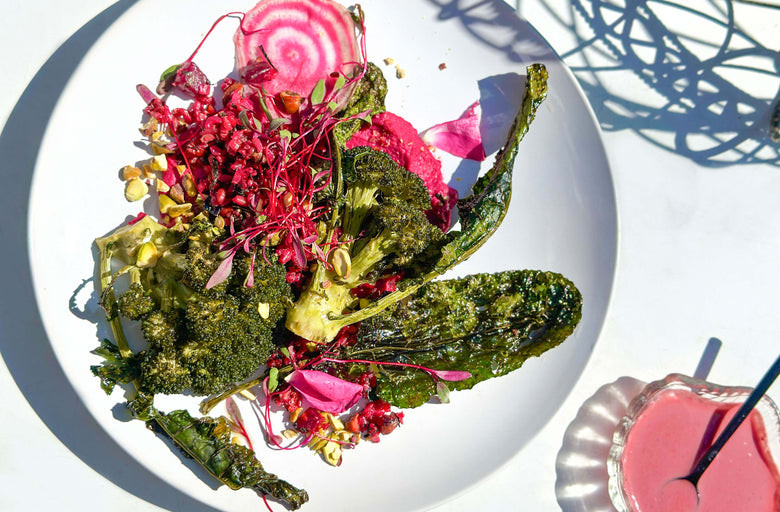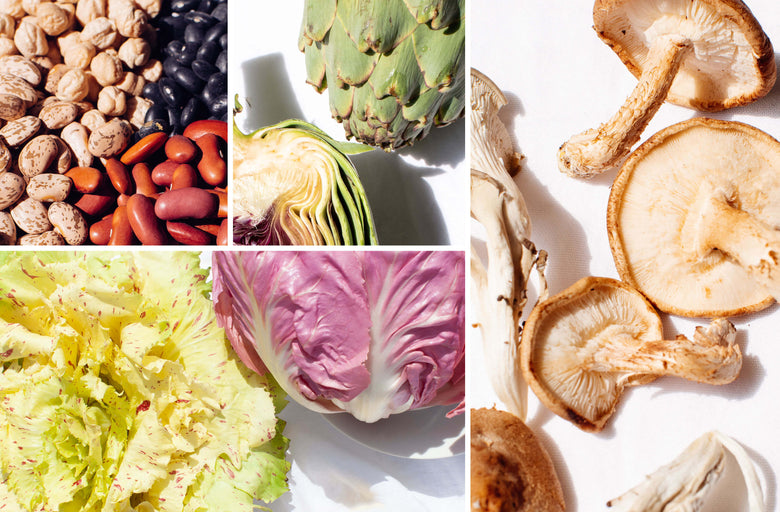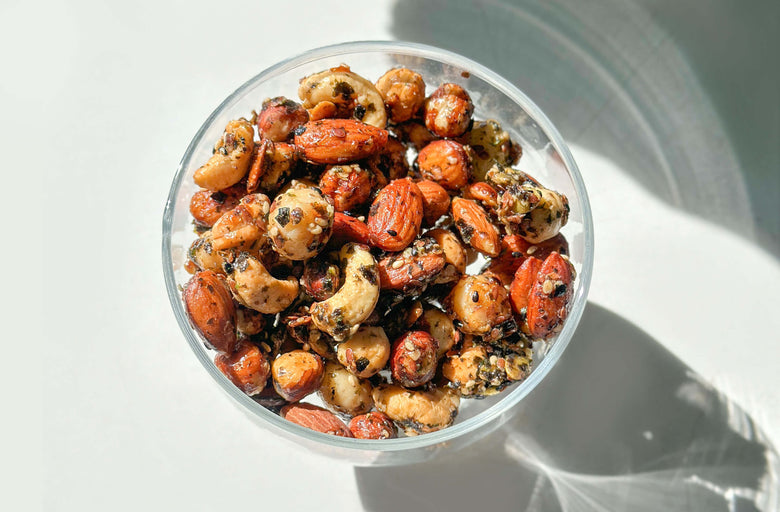Our beliefs become our behavior. For example, meditation's intent is to release what no longer serves us and rewire our subconscious, changing our beliefs and our default thoughts. The same idea can be applied to food; where certain choices can shift our mindset, cloud judgment, or bring us joy. There is clear scientific evidence that supports what you put into your body has an extreme effect on your innate spiritual and psychological nature. There are whole squads of “food designers” concocting addictive, processed food with the intention to activate our brain’s “bliss point,” and essentially confuse our nervous system. Nothing tastes exceptionally decadent enough to make you satisfied, but we’ll go through the whole bag trying to get there.
Research is illuminating a powerful antidote, championed by clinical psychiatrist, author, and farmer Dr. Drew Ramsey: we can use nutrition and diet to create a healthy, happy brain. There is a universe of whole, high-quality foods, and plants with indulgent, complex flavors. Our brain thrives on these foods. High-quality, diverse, delicious nutrition fosters a brain that is primed to create new neural pathways, receptive to sit in peace and meditate, and turned on to thoughts that serve us in productive, loving ways.
As we straddle the line between science and spirit, we wanted to get both sides of the story. So, we asked a doctor who studies the connection between diet and the brain, and a woman who transformed her life (and built a business!) after shifting her perception through eating for her mind and body. As we sat down to chat with Dr. Ramsey himself, and Sakara co-founder Danielle Duboise, it was clear these experts know the keys to mind/body happiness and how mental health plays an important piece in it all. We chatted food, changing brain patterns, and tips on how to achieve ultimate brain joy...this isn’t slapping on a smile and repeating a mantra; this is peeling back the curtain to find the light— and there's a lot of delicious food involved.
What makes a healthy brain?
Dr. Drew Ramsey: Healthy brains are better connected. From the brain cells perspective, it means neurons that are more plentiful, more resilient, and more connected to other brain cells. For people in our lives, it means more contentment and clarity, and it means more connection. People seem to be most content when they are connected to themselves, their loved ones, and a sense of purpose or mission. We look at brain health today in many new ways, from genetics to neuroimaging, and are increasingly thinking of brain health in terms of inflammation and brain health as related to gut health. Rather than think of happy brains at the goal, I prefer to think of it as helping people better cultivate a personal pursuit of brain health and using that brain to generate more love in their lives.
Danielle Duboise: When I think about healthy brains, I think about healthy minds–So, not just from a physiological perspective, but also from a spiritual perspective. A healthy mind/brain is one that allows us to make choices that make us into healthier, happier and more loving humans. I used to have an unhealthy brain. One that told me I had to count calories, lose weight and live in a perpetual cycle of guilt and shame around food. My healthy mind today tells me that food is nourishment and I should eat MORE of the things that nourish me, not less. You have to think well just as much as you eat well.
Is it possible to create new neural pathways?
Dr. Drew Ramsey: You know that old adage that people don’t really change? It’s not true. Our brain is always changing at the cellular level. Neuroplasticity is the processes that allow the brain to create new connections between neurons. It’s really critical that people understand in 2019 that your brain is listening to all the choices you make. Who doesn’t want a brain with more connections?
Danielle Duboise: People always think that how they've been is how they are. The beautiful thing is that we're always changing. If you want to enact change remember it's already happening, you just need to guide it. Small changes equal HUGE results. Studies show that doing something as simple as not multitasking while eating changes how you taste your food! The more you slow down and focus, the better it tastes and the less you eat. That's a tiny change with a HUGE result.
How does meditation affect the brain? Is the science there to back it up?
Dr. Drew Ramsey: It’s funny how we look to science to validate things like meditation and mindfulness. The science has gotten more nuanced, but it comes down to a simple fact. Too much stress and too little sleep lead to more inflammation in the brain. Inflammation is increasingly understood as a risk factor for depression and dementia. It’s hard for scientific studies to capture the downstream effects of a more mindful life. The best data is probably in ourselves. When we live with intention and seek to foster connection, what is the overall effect on our personal and community health?
Danielle Duboise: A recent study on Scientific American suggests that mentally taxing tasks dampen our perception of taste, causing us to eat more. In four experiments, participants attempted to memorize either a seven-digit number (a heavy load on the brain) or one digit (a light cognitive load) while tasting salty, sweet and sour substances and rating each food's taste intensity. In all experiments, participants under the heavy cognitive load rated each type of taste as less intense, and they also ate more of the sweet and salty substances. The researchers believe cognitive load may compete with sensory input for our attention. Other studies have found that simply paying mindful attention to one's food—fully focusing on its taste, aroma, and texture, for example—leads to less intake.
How does stress factor into brain happiness?
Dr. Drew Ramsey: Stress distracts the brain from its primary job of creating love and connection. Mic drop.
Danielle Duboise: Toxic thoughts can lead to many physiological stressors—think an increase in cortisol and blood pressure with a decrease in deep REM sleep, all wreaking havoc on hormonal health and causing inflammation. Then there are metabolic stressors such as pesticide residue on food, eating highly processed oils or breathing toxic air. To decrease stress, get out in clean nature, eat truly clean food and bring more mindfulness to our every day. This helps the mind and body heal, allowing for healthier thoughts and decreased metabolic stress.
Dr. Drew Ramsey’s 2 Tips for Ultimate Brain Joy
- Be active about your brain care. People think of the brain as the foundation of happiness and contentment. Not that perfect brain care eliminates all mental health concerns, but rather that our mental health rests on the pillars of good brain health. Brain care today should be something you are ACTIVE about. People work hard to improve their strength, endurance, and flexibility. What do you do to enhance your emotional resilience, empathy and sleep quality? Usually, such mental health goals are not part of people’s wellness plan. For optimal health, that needs to change.
- Feed your brain. For most people we work with clinically, we see a need for more plants, more leafy greens, and more omega-3s and healthy fats. Eating fermented foods like kefir, sauerkraut, and kimchi along with prebiotic plants like onions, garlic, and bananas is the best long-term plan for a healthy microbiome. There is so much we can do for our brain health: move our bodies more, make sleep quality sacred, spend more time in nature and with those we love, the point of all these options is empowerment. Keep it simple. Take care of your mental health each day as best you can and get the right help when you need it.






